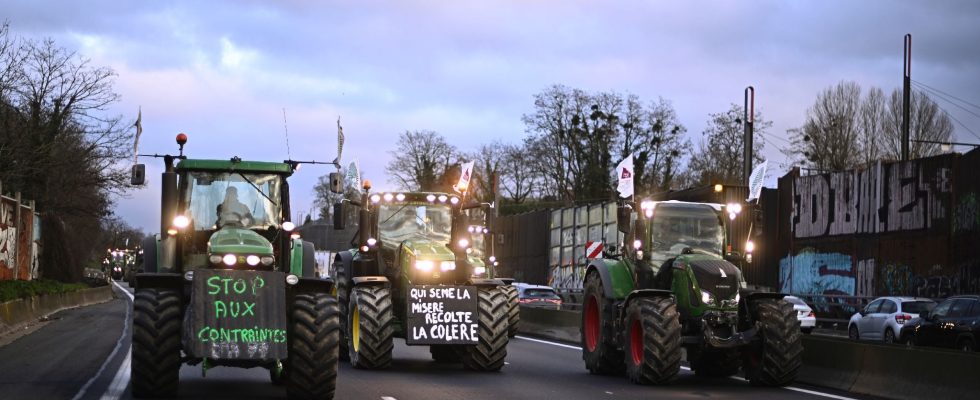Despite the executive’s attempts to calm the mobilization, the farmers are moving closer to Paris, Wednesday January 31, and to the Rungis wholesale market, the food hub of the capital, which they wish to block. Around a hundred blockade points and 10,000 demonstrators were identified. On the executive side, the Minister of Agriculture, Marc Fesneau, is expected in Brussels on Wednesday afternoon for “a series of interviews aimed at accelerating the treatment of European emergencies”, his office indicated.
⇒ A convoy of 200 to 300 farmers left the southwest on Tuesday evening and headed towards the capital
⇒ The Minister of Agriculture, Marc Fesneau, is expected in Brussels on Wednesday afternoon
⇒ Commercial negotiations between large retailers and their agro-industrial suppliers on shelf prices end on Wednesday evening
80 million for wine growers
The Minister of Agriculture announced Wednesday morning on Sud Radio that the government would release 80 million euros to support “all wine regions which are in crisis”.
Marc Fesneau also declared that the State would cover “loan interest for the year 2024” to relieve the cash flow of winegrowers in difficulty.
Heading for the Rungis market
Farmers, who are trying to put pressure on the government, are approaching the capital and the Rungis wholesale market on Wednesday January 31, the food hub of Ile-de-France. 100 blockade points and 10,000 demonstrators were recorded. Tuesday evening, a convoy of 200 to 300 tractors leaving from the southwest towards Rungis stopped between Vierzon and Orléans, in Loir-et-Cher, to spend the night there. Earlier, in the villages crossed, many residents had come out to greet them and applaud their passage, sometimes brandishing French flags, AFP reported.
The president of the Lot-et-Garonne Rural Coordination, Serge Bousquet-Cassagne, joined the convoy: “I am very proud of you! You are going to lead this fight because if we do not lead this fight, we are dead” , he told the demonstrators. “Tomorrow, we will have to be serious and disciplined,” he insisted, haranguing his troops.
Blockages around Lyon
The convoys remain closely monitored by law enforcement. Tuesday evening, armored vehicles from the gendarmerie were deployed on the A6 a few kilometers from Rungis, near Chilly-Mazarin (Essonne), where tractors from the FDSEA of Seine-et-Marne are positioned, without incident, according to the police. Even if on certain dams, the situation has become somewhat tense in Ile-de-France.
Territorial intelligence services identified nearly 120 blockage points the day before, with 12,000 farmers mobilized and more than 6,000 tractors nationally. Farmers also continue their progress towards Lyon on Wednesday, with the aim of blockading France’s third city. Tractors blocked the A89, which links Lyon to Clermont-Ferrand, at the end of the day.
Marc Fesneau visiting Brussels
The Prime Minister, Gabriel Attal, assured Tuesday that there must “be a French agricultural exception” and promised that the government would be “there, without any ambiguity” to respond to the current agricultural crisis, in his speech of general policy before the National Assembly. The Minister of Agriculture, Marc Fesneau, is expected in Brussels on Wednesday afternoon “for a series of interviews aimed at accelerating the treatment of European emergencies”, his office said on Tuesday.
On Wednesday, the Minister of the Economy, Bruno Le Maire, promised that France would engage in a “showdown” during negotiations in Brussels so that the EU-Mercosur agreement (Brazil, Argentina, Uruguay, Paraguay) “as it is today, do not be signed”. “This Mercosur agreement, as it is, is not good for our breeders,” promised the minister on CNews and Europe 1, while France has been shaken for almost two weeks by mobilizations of angry farmers .
Recalling that the agricultural crisis would not be resolved “in a few days”, Gabriel Attal said he was ready to “go further”, promising for example that European aid from the Common Agricultural Policy (CAP) would be paid “by March 15” and additional tax assistance for breeders. Received Tuesday evening in Matignon for almost three hours, the FNSEA and the Young Farmers did not comment publicly on the latest commitments of the executive.
President Emmanuel Macron, during a state visit to Sweden, for his part pledged to defend several demands of French farmers in Brussels, on Ukraine, fallow land and the trade agreement with Latin countries. Americans from Mercosur.
Difficult price negotiations
Commercial negotiations between large retailers and their agro-industrial suppliers on shelf prices ended Wednesday evening in a tense atmosphere, due to the angry movement of farmers. During his general policy speech to the National Assembly on Tuesday, Gabriel Attal mentioned the General Directorate of Competition, Consumption and Fraud Repression (DGCCRF), whose inspectors must ensure that contracts signed before Wednesday midnight between mass distribution and its agro-industrial suppliers respect the legal framework. “As of last week, 100 additional DGCCRF inspectors began their checks on the ground, which will be twice as numerous as before,” he declared in particular, referring to “an unprecedented wave of checks”.
Every year, commercial negotiations take place between agri-food companies (from small charcuterie producers to giants Unilever, Nestlé or Coca-Cola) and their supermarket clients (E.Leclerc, Carrefour, Intermarché or Système U). They must agree on the conditions of sale for a large part of the products sold in supermarkets the rest of the year. Some organizations, starting with the FNSEA, have criticized the government for focusing too much on combating soaring prices on supermarket shelves, rather than on preserving farmers’ income.
